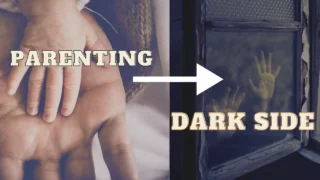Have you ever been in a position where as a child you are held responsible for something that is unrelated to you and goes wrong in your parents' life?
"The Silent Screams" paints a haunting portrait of a child trapped in the relentless cycle of parental manipulation. Caught in a web of conflicting expectations, the child is subjected to a barrage of unfounded accusations, blaming them for the turmoil within the family. You can't seem to figure out what went wrong, but you're always wondering! Yes, it occurs in practically every home.
When a parent arrives home from work, you are eager to greet them and tell them about your experience, but all of a sudden, they begin to rant that you are a very self-centered child, that having you around makes their life miserable, and that you were their worst decision. And even after that, they are unaware of how deeply it hurt you. But then you make the decision to be a good kid and quit disturbing them by minding your own business. However, they are also not pleased with it. They start complaining that you don't share anything with them, spend the entire day in your room, and show them the least amount of interest! Because your parents are sending you conflicting messages, you are now even more perplexed and unsure of what they still expect from you.
The child's perplexity turns into excruciating anxiety. When a child is young, they may find it difficult to absorb what to say or do next, how to carry on a conversation, or how to comfort their carer and show them love and respect. Parents manipulate by lying to you constantly, even when it's not necessary; hiding information from you, particularly that which is pertinent to your life; using guilt trips to extract concessions; attempting to dictate your every action; and making decisions for you without consulting you or getting your permission and use child in their power battle with other family members. Gaslighting, guilt induction, seclusion, love withdrawal, and vulnerability-exploitation are common manipulation techniques. Their personality suffers as a result of this ongoing tension, and they eventually start to get quite nervous over the smallest of things.
In the relentless storm of parental manipulation, the child is burdened with every conceivable familial woe—financial struggles, forsaken dreams, and the loss of freedom—all laid at their feet. The insidious campaign shapes the child's identity, fostering a lifelong sense of guilt and unworthiness. This warped self-perception persists into adulthood, poisoning relationships and perpetuating a cycle of self-blame. "Their Freedom, Their Dreams, Their Strife—Everything Because of You" paints a stark and haunting picture of the enduring trauma wrought by manipulative parenting, where a once-innocent soul becomes the unwitting casualty of a lifetime of emotional warfare. As the child matures into adulthood, they confront a profound revelation: the silent screams echoing through their upbringing were projections of their parents' unresolved trauma and insecurities. The journey to break free from this emotional stranglehold becomes a defining chapter marked by the arduous process of unraveling parental manipulation. Deciding to sever this trauma bond and pursue happiness is a tumultuous struggle, haunted forever by the lingering specter of the past.
As you take the courageous step to move forward in your life, liberated from the shackles of parental manipulation, a haunting truth unveils itself. Your parents, far from embracing your pursuit of happiness, demand you to love them, care for them and respect them for having done so much for you and to return gratitude for raising you. Should you falter, an ominous return to your newfound joy awaits—a return not of joy, but of their own burdened negativity, intended to cast a shadow on your newfound happiness. Yet, amidst the tumult, a crucial revelation emerges: it is not your fault. The burden lies squarely on the shoulders of parents who chose to bring you into the world but were unprepared to shoulder the responsibility that accompanied your existence.
Breaking this cycle becomes a task, demanding a keen sense of timing. Your parents will not be happy with your decision to move on in life, they will expect you to love them, care for them and respect them for having done so much for you and a return gratitude for raising you. If failed to do so they come back in your happy life to spread the negativity that they are burdened with to make you and your new family guilty. Now they will blame for being ungrateful and this how gaslighting works. This cycle will go on and on until you learn how to break it. you can overcome this with help from friends, therapists and other closed ones.

Comments